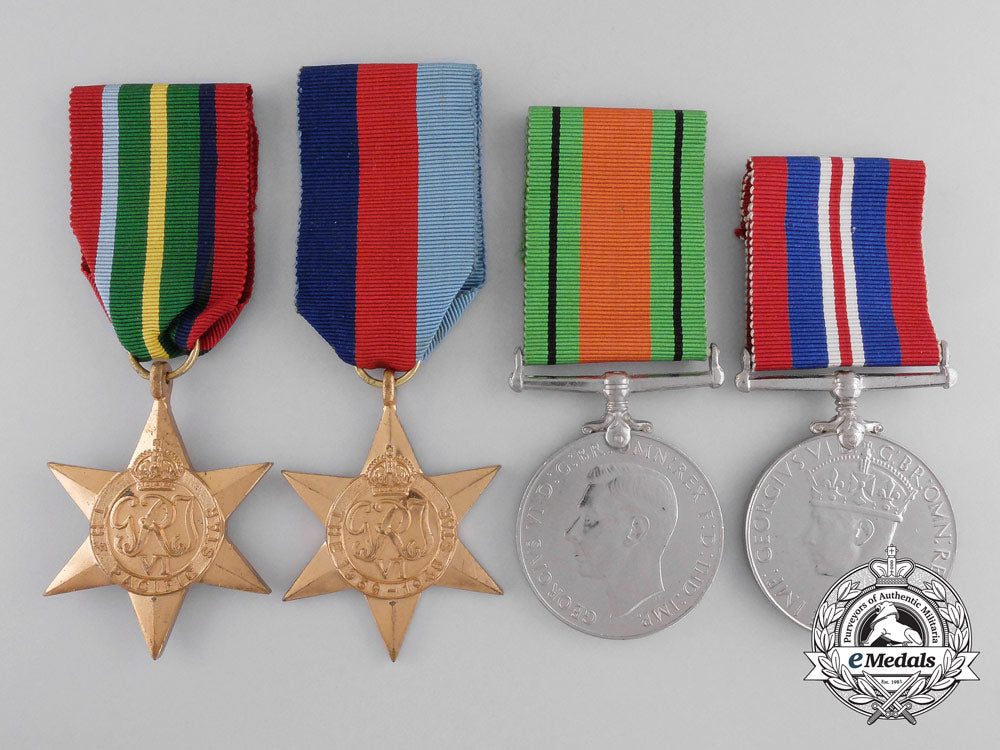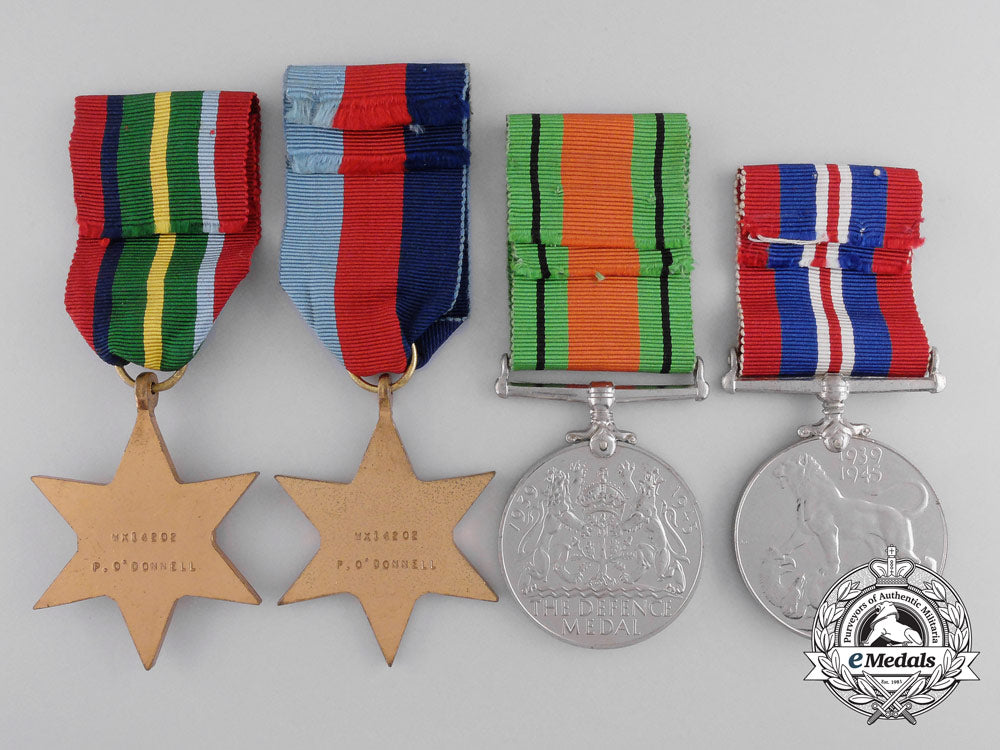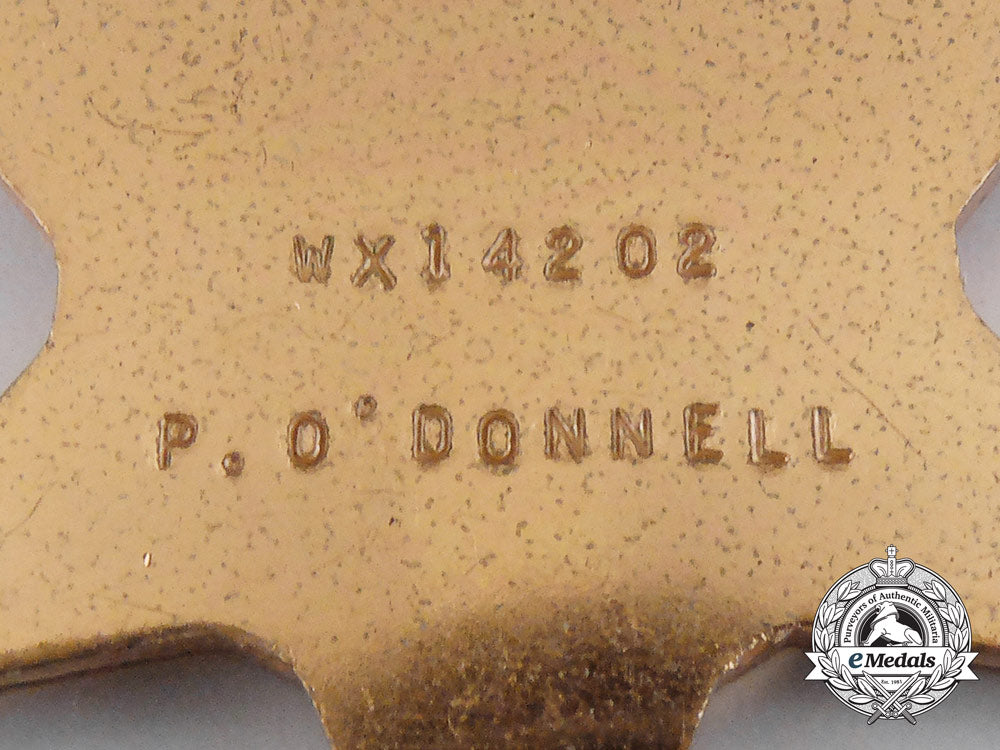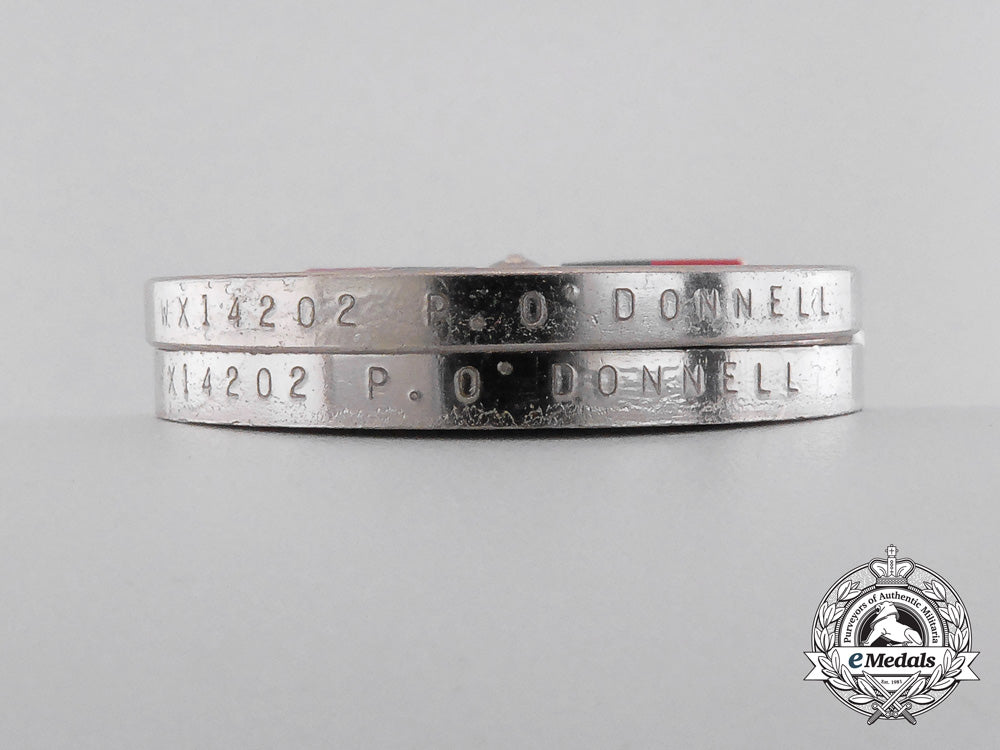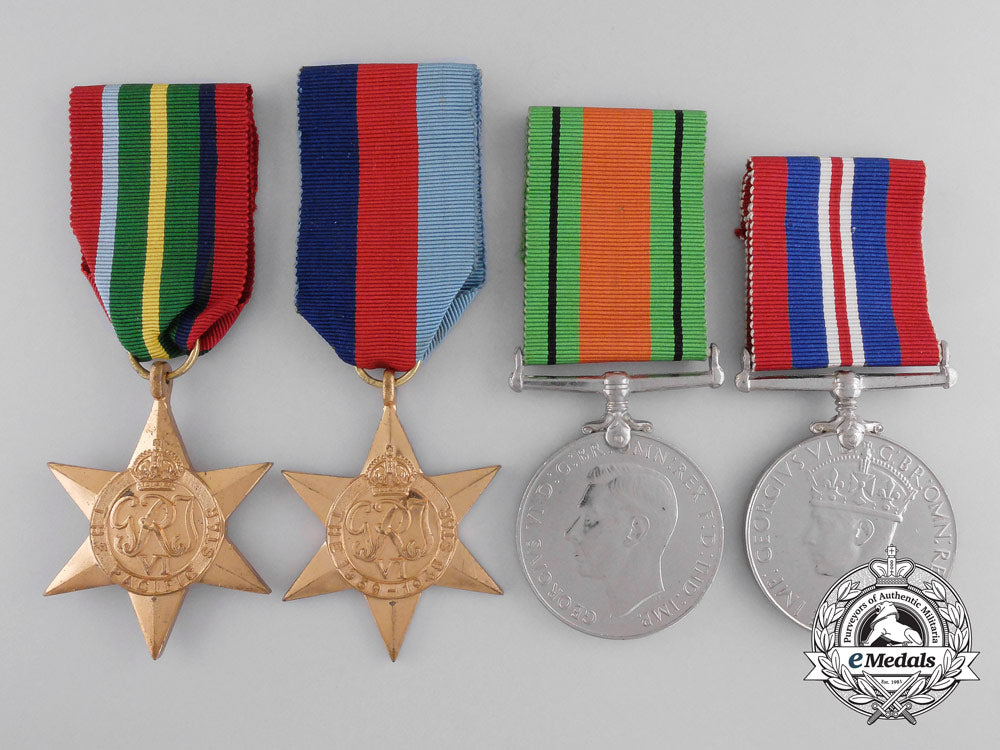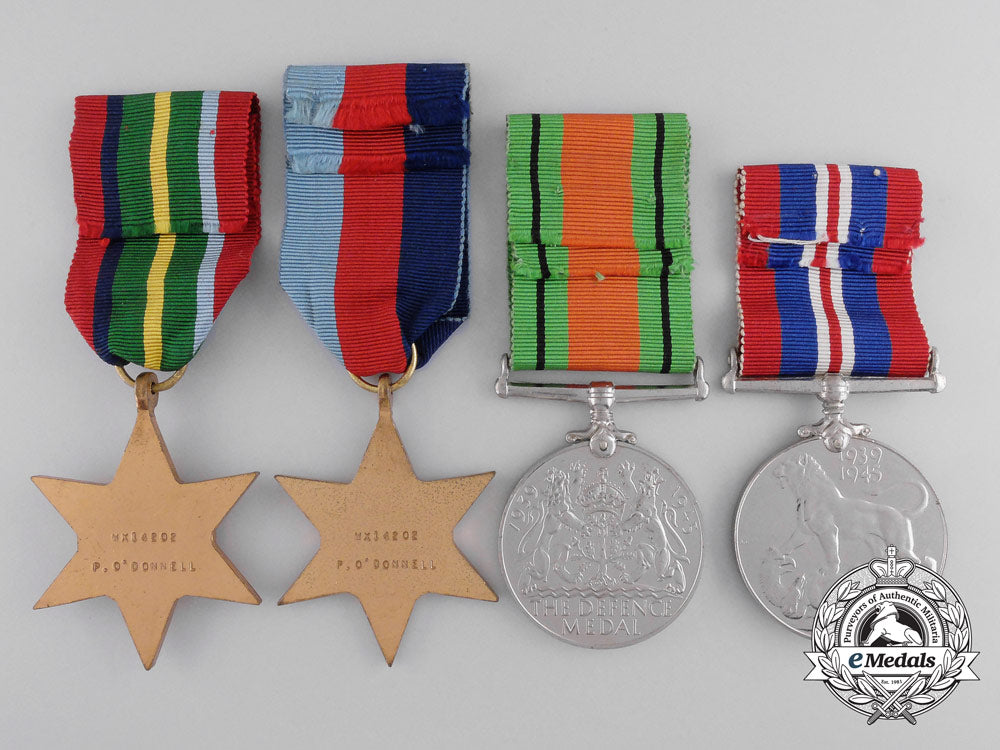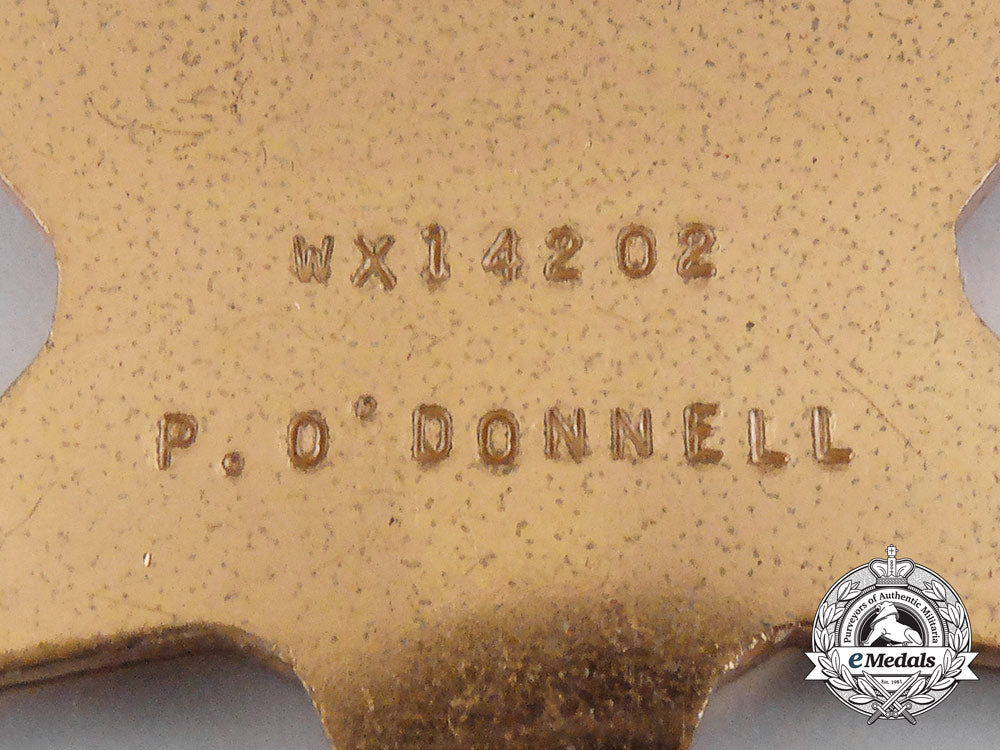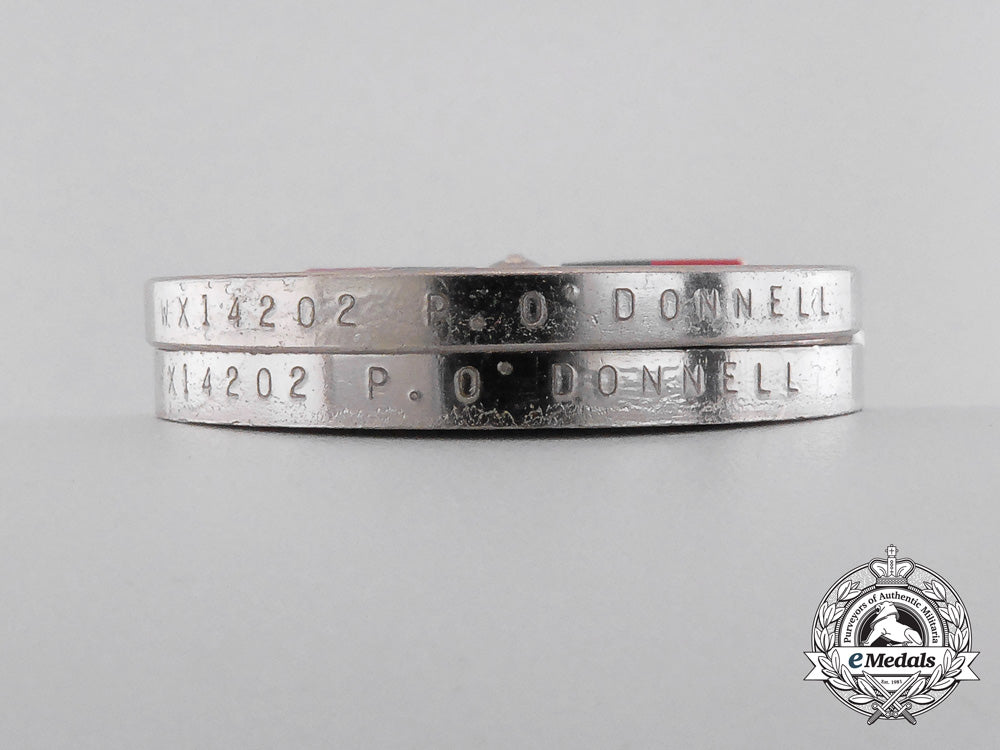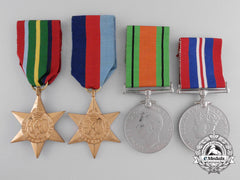
LOADING ...
In response to evolving domestic opinion, eMedals Inc has made the conscious decision to remove the presentation of German Third Reich historical artifacts from our online catalogue. For three decades, eMedals Inc has made an effort to preserve history in all its forms. As historians and researchers, we have managed sensitive articles and materials with the greatest of care and respect for their past and present social context. We acknowledge the growing sentiments put forth by the Canadian public and have taken proactive actions to address this opinion.
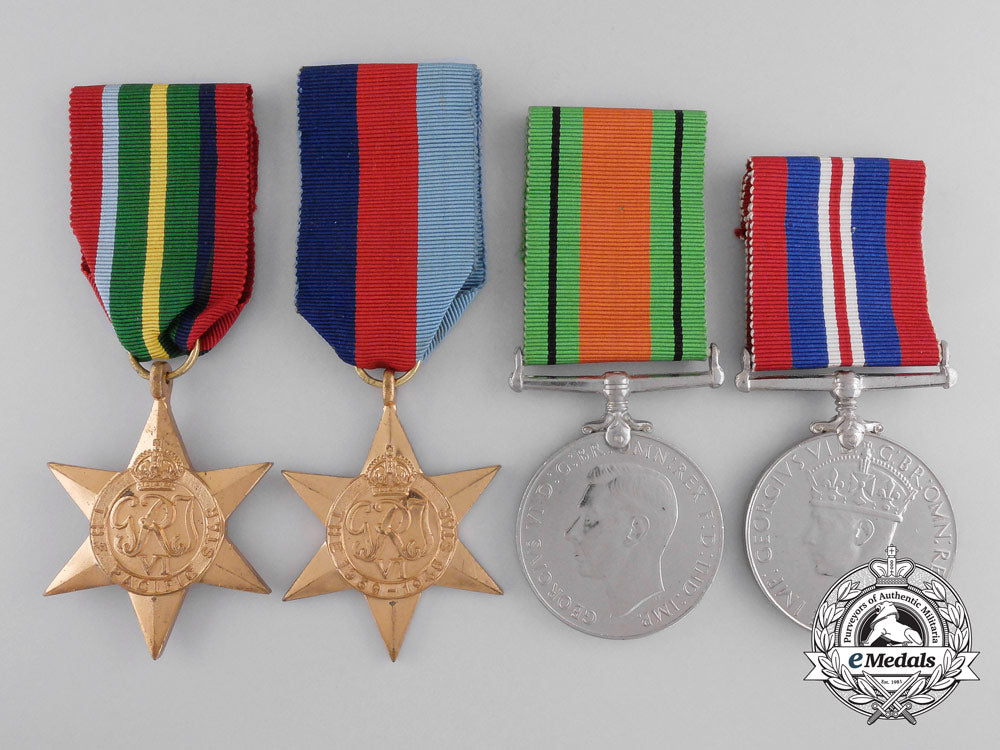
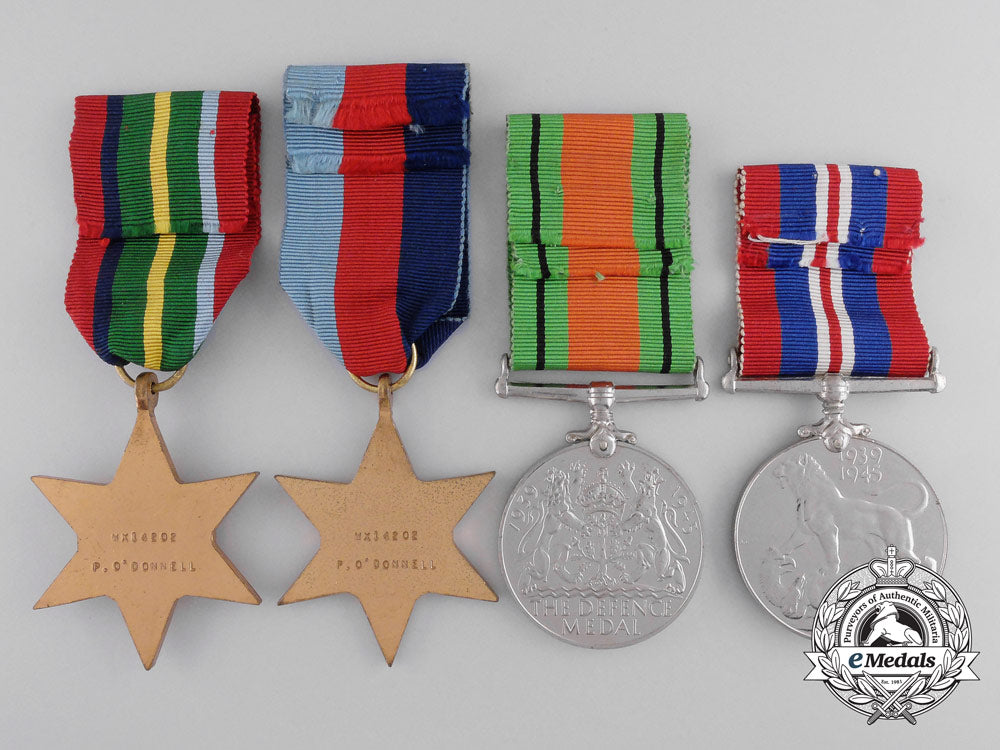
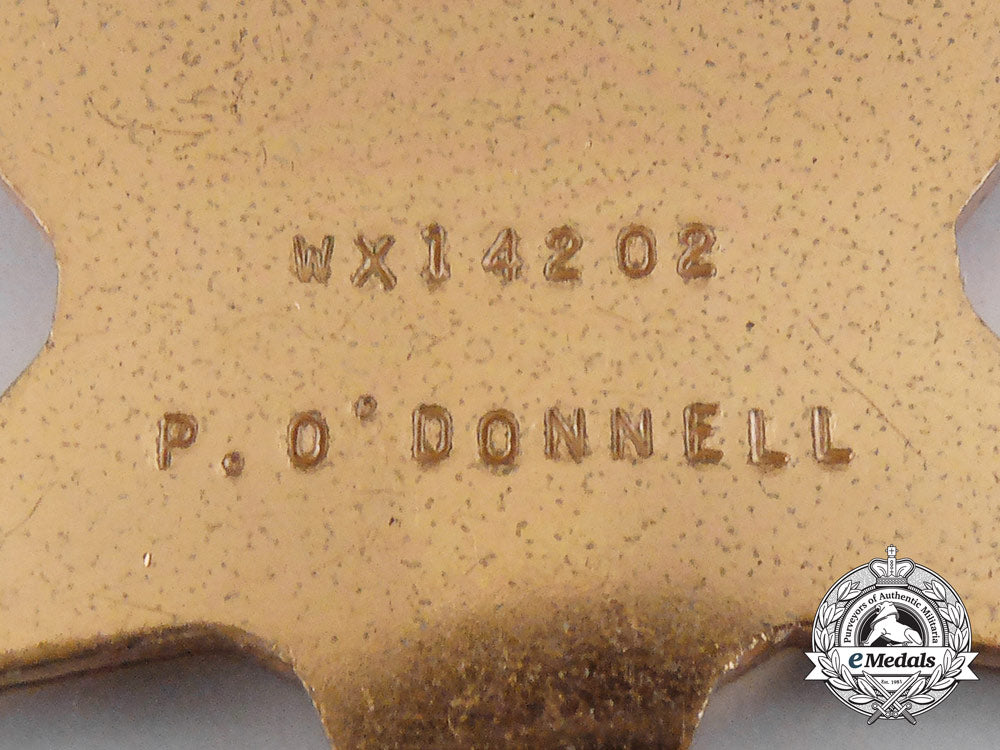
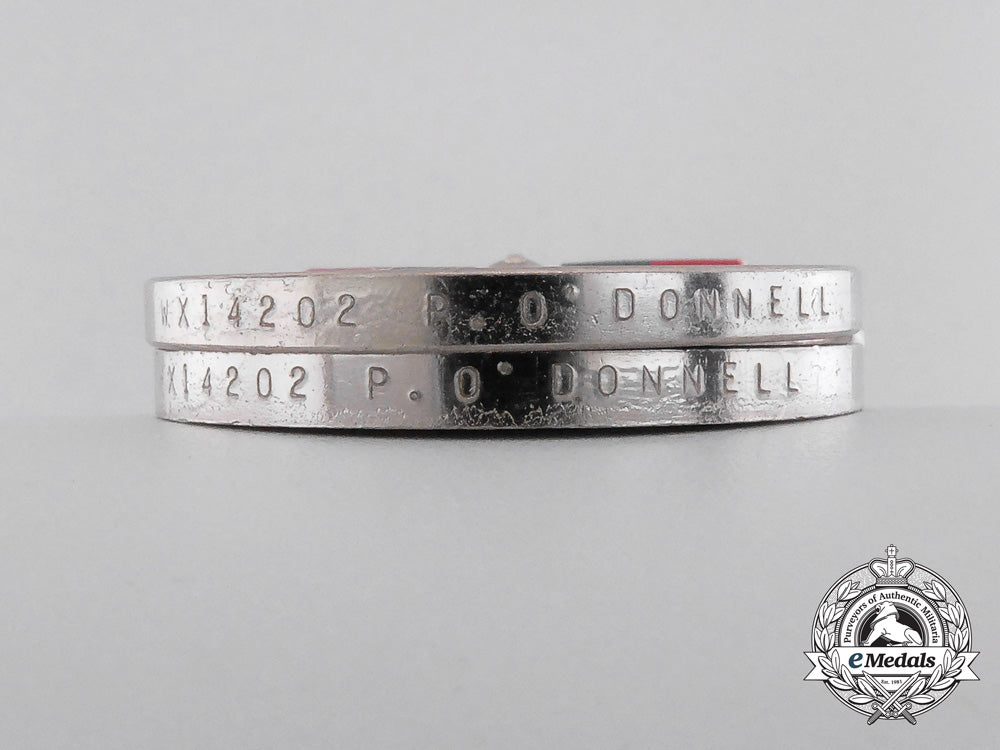
An Australian Group To Private O'donnell Who Was Wounded In Action Near Wau,
An Australian Group To Private O'donnell Who Was Wounded In Action Near Wau,
SKU: ITEM: W3984
Current Bid:
Your Max Bid:
Bid History:
Time Remaining:
Couldn't load pickup availability
Shipping Details
Shipping Details
eMedals offers rapid domestic and international shipping. Orders received prior to 12:00pm (EST) will be shipped on the same business day.* Orders placed on Canadian Federal holidays will be dispatched the subsequent business day. Courier tracking numbers are provided for all shipments. All items purchased from eMedals can be returned for a full monetary refund or merchandise credit, providing the criteria presented in our Terms & Conditions are met. *Please note that the addition of a COA may impact dispatch time.
Shipping Details
eMedals offers rapid domestic and international shipping. Orders received prior to 12:00pm (EST) will be shipped on the same business day.* Orders placed on Canadian Federal holidays will be dispatched the subsequent business day. Courier tracking numbers are provided for all shipments. All items purchased from eMedals can be returned for a full monetary refund or merchandise credit, providing the criteria presented in our Terms & Conditions are met. *Please note that the addition of a COA may impact dispatch time.
Description
Description
Second World War Group of Four, Private Patrick O'Donnell, 28th Battalion, 7th Battalion, Australian Imperial Force, Wounded in Action near Wau, Papua New Guinea 2ND REVISION
1939-1945 Star (WX14202 P. O'DONNELL); Pacific Star (WX14202 P. O'DONNELL); Defence Medal (WX14202 P. O'DONNELL); and War Medal 1939-1945 (WX14202 P. O'DONNELL). Naming is officially impressed. Un-mounted, original ribbons, cleaned, contact marks, very fine. Accompanied by assorted research papers.
Footnote: Patrick O'Donnell was born on January 13, 1906 in Goschen, Victoria. He enlisted with the Australian Imperial Force as a Private (WX14202) at the Recruit Reception Depot in Claremont, Western Australia on June 11, 1941, at the age of 35, naming his personal contact as his friend, Robert Tims of Leonora, Western Australia (later of Melbourne, Victoria), stating that he was Single, that his religion was Roman Catholic and that his occupation was that of Battery Hand. He was initially posted to the Training Depot at the Naval Base, then posted to the 13th Infantry Training Battalion (ITB) at Northam, Perth, Western Australia on June 20th. Private O'Donnell embarked Freemantle, Western Australia for the Middle East, with infantry reinforcements, aboard the Transport US13 on November 7th, disembarking at Suez, Egypt on the 24th. He was sent to camp in Palestine, followed by a transfer to the 24th Infantry Training Battalion on February 16, 1942, then a posting to 2/7th Infantry Battalion, 17th Brigade near Gaza on February 17th. After four months in the Middle East, Private O'Donnell embarked Suez on March 12, 1942 for Garrison Duty in Ceylon (now Sri Lanka), in defence against the Japanese, arriving on March 28th. A little over four months later, with his Garrison Duty completed, he left left Ceylon, disembarking at Melbourne on August 4, 1942. Upon arrival, he was sent to camp at Sydney, New South Wales. He was hospitalized "sick" for ten days, from October 29 to November 7, 1942. One week after his discharge from hospital, he was posted to Brisbane Depot on November 15th. PrivateO'Donnell embarked Townsville, Queensville for Milne Bay, New Guinea (code named Fall River), aboard the Transport Ship SS Taroona on November 30, 1942, for operations in New Guinea near Port Moresby. Two months later, he was sent to Wau by air on January 30, 1943, in defence against the Japanese advance from Bulolo. Wau is a village in the interior of the Papuan peninsula, approximately thirty miles southwest of Salamaua. An airfield had been built there during an area gold rush in the 1920s and 1930s. This airfield was of great value to the Australians during the fighting for northeast Papua. Once the Japanese had decided to give up on Guadalcanal, the capture of Port Moresby loomed even larger in their strategic thinking. Taking the airfield at Wau was a crucial step in this process, and to this end, the 51st Division was transferred from Indochina and placed under General Hitoshi Imamura's Eighth Area Army at Rabaul; one regiment arrived at Lae in early January 1943. In addition, about 5,400 survivors of the Japanese defeat at Buna-Gona were moved into the Lae-Salamaua area. Opposing these forces were the Australian 2/5th, 2/6th and 2/7th Battalions along with Lieutenant Colonel Norman Fleay's Kanga Force. Forces of the Empire of Japan sailed from Rabaul and crossed the Solomon Sea and, despite Allied air attacks, successfully reached Lae, where they disembarked. Japanese troops then advanced overland on Wau, an Australian base that potentially threatened the Japanese positions at Salamaua and Lae. A race developed between the Japanese moving overland, hampered by the terrain, and the Australians, moving by air, hampered by the weather. By the time the Japanese reached the Wau area, after a trek over the mountains, the Australian defenders had been greatly reinforced by air. In the battle that followed, despite achieving tactical surprise by approaching from an unexpected direction, the Japanese attackers were unable to capture Wau. The Australians decisively turned back the Japanese assault in the ensuing Battle of Wau, fought between January 29 and 31, 1943. In continued fighting after the battle, Private O'Donnell was Wounded in Action, suffering gunshot wounds to his left arm, left thigh and right knee on February 3, 1943. He was initially evacuated to Port Moresby, then evacuated from Port Moresby to Australia aboard the 2/1st Hospital Ship Manunda, arriving in Brisbane, Queensland on February 19th, where he was admitted to the 114th Australian General Hospital, where his left arm was amputated. After four months in hospital in Brisbane, he returned to Western Australia, where he was admitted to the 110th Australian General Hospital in Perth on June 20, 1943. Eleven months later, Private PatrickO'Donnell was posted to the Perth Depot on May 29, 1944, then discharged two weeks later as "Medically Unfit" at Claremont, on June 12th. For his Second World War service, O'Donnell was awarded the 1939-1945 Star, the Pacific Star, the Defence Medal, the War Medal 1939-1945 and the Australia Service Medal 1939-1945, the later of which is not included with this group, the medals being issued in 1952. He died on September 26, 1960 in Melbourne, at the age of 54
Description
Second World War Group of Four, Private Patrick O'Donnell, 28th Battalion, 7th Battalion, Australian Imperial Force, Wounded in Action near Wau, Papua New Guinea 2ND REVISION
1939-1945 Star (WX14202 P. O'DONNELL); Pacific Star (WX14202 P. O'DONNELL); Defence Medal (WX14202 P. O'DONNELL); and War Medal 1939-1945 (WX14202 P. O'DONNELL). Naming is officially impressed. Un-mounted, original ribbons, cleaned, contact marks, very fine. Accompanied by assorted research papers.
Footnote: Patrick O'Donnell was born on January 13, 1906 in Goschen, Victoria. He enlisted with the Australian Imperial Force as a Private (WX14202) at the Recruit Reception Depot in Claremont, Western Australia on June 11, 1941, at the age of 35, naming his personal contact as his friend, Robert Tims of Leonora, Western Australia (later of Melbourne, Victoria), stating that he was Single, that his religion was Roman Catholic and that his occupation was that of Battery Hand. He was initially posted to the Training Depot at the Naval Base, then posted to the 13th Infantry Training Battalion (ITB) at Northam, Perth, Western Australia on June 20th. Private O'Donnell embarked Freemantle, Western Australia for the Middle East, with infantry reinforcements, aboard the Transport US13 on November 7th, disembarking at Suez, Egypt on the 24th. He was sent to camp in Palestine, followed by a transfer to the 24th Infantry Training Battalion on February 16, 1942, then a posting to 2/7th Infantry Battalion, 17th Brigade near Gaza on February 17th. After four months in the Middle East, Private O'Donnell embarked Suez on March 12, 1942 for Garrison Duty in Ceylon (now Sri Lanka), in defence against the Japanese, arriving on March 28th. A little over four months later, with his Garrison Duty completed, he left left Ceylon, disembarking at Melbourne on August 4, 1942. Upon arrival, he was sent to camp at Sydney, New South Wales. He was hospitalized "sick" for ten days, from October 29 to November 7, 1942. One week after his discharge from hospital, he was posted to Brisbane Depot on November 15th. PrivateO'Donnell embarked Townsville, Queensville for Milne Bay, New Guinea (code named Fall River), aboard the Transport Ship SS Taroona on November 30, 1942, for operations in New Guinea near Port Moresby. Two months later, he was sent to Wau by air on January 30, 1943, in defence against the Japanese advance from Bulolo. Wau is a village in the interior of the Papuan peninsula, approximately thirty miles southwest of Salamaua. An airfield had been built there during an area gold rush in the 1920s and 1930s. This airfield was of great value to the Australians during the fighting for northeast Papua. Once the Japanese had decided to give up on Guadalcanal, the capture of Port Moresby loomed even larger in their strategic thinking. Taking the airfield at Wau was a crucial step in this process, and to this end, the 51st Division was transferred from Indochina and placed under General Hitoshi Imamura's Eighth Area Army at Rabaul; one regiment arrived at Lae in early January 1943. In addition, about 5,400 survivors of the Japanese defeat at Buna-Gona were moved into the Lae-Salamaua area. Opposing these forces were the Australian 2/5th, 2/6th and 2/7th Battalions along with Lieutenant Colonel Norman Fleay's Kanga Force. Forces of the Empire of Japan sailed from Rabaul and crossed the Solomon Sea and, despite Allied air attacks, successfully reached Lae, where they disembarked. Japanese troops then advanced overland on Wau, an Australian base that potentially threatened the Japanese positions at Salamaua and Lae. A race developed between the Japanese moving overland, hampered by the terrain, and the Australians, moving by air, hampered by the weather. By the time the Japanese reached the Wau area, after a trek over the mountains, the Australian defenders had been greatly reinforced by air. In the battle that followed, despite achieving tactical surprise by approaching from an unexpected direction, the Japanese attackers were unable to capture Wau. The Australians decisively turned back the Japanese assault in the ensuing Battle of Wau, fought between January 29 and 31, 1943. In continued fighting after the battle, Private O'Donnell was Wounded in Action, suffering gunshot wounds to his left arm, left thigh and right knee on February 3, 1943. He was initially evacuated to Port Moresby, then evacuated from Port Moresby to Australia aboard the 2/1st Hospital Ship Manunda, arriving in Brisbane, Queensland on February 19th, where he was admitted to the 114th Australian General Hospital, where his left arm was amputated. After four months in hospital in Brisbane, he returned to Western Australia, where he was admitted to the 110th Australian General Hospital in Perth on June 20, 1943. Eleven months later, Private PatrickO'Donnell was posted to the Perth Depot on May 29, 1944, then discharged two weeks later as "Medically Unfit" at Claremont, on June 12th. For his Second World War service, O'Donnell was awarded the 1939-1945 Star, the Pacific Star, the Defence Medal, the War Medal 1939-1945 and the Australia Service Medal 1939-1945, the later of which is not included with this group, the medals being issued in 1952. He died on September 26, 1960 in Melbourne, at the age of 54
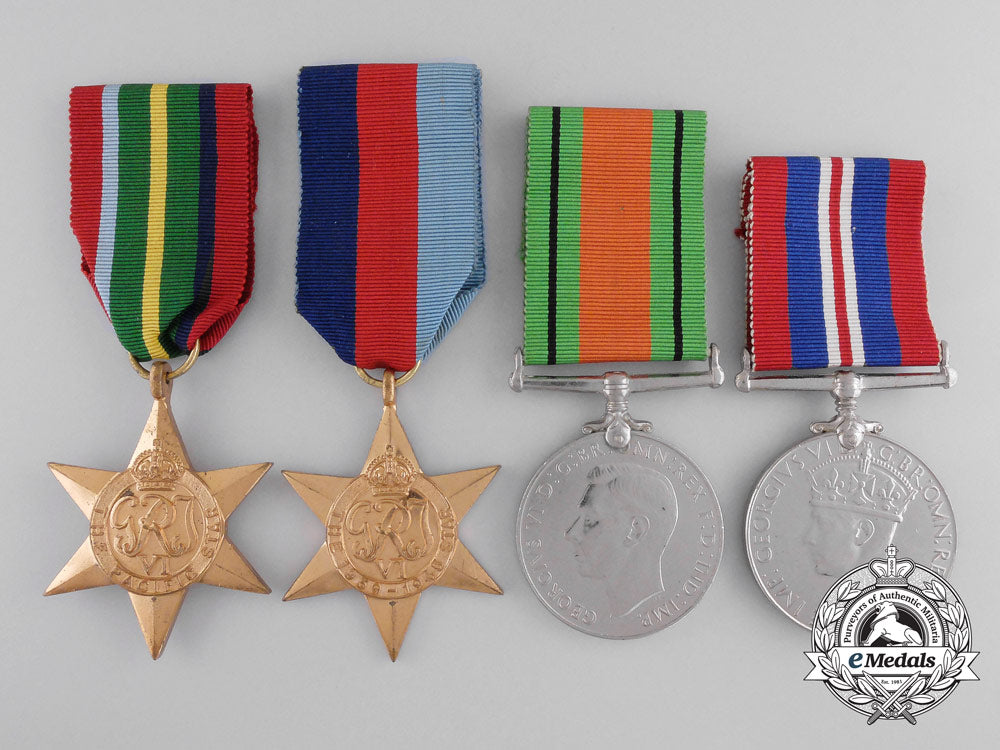
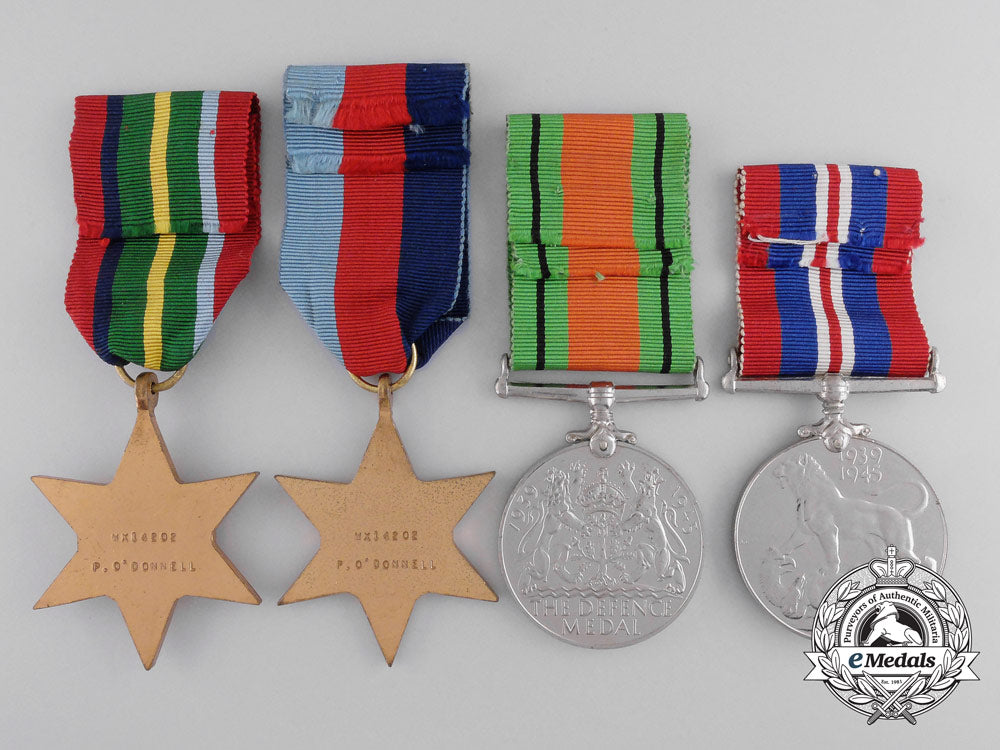
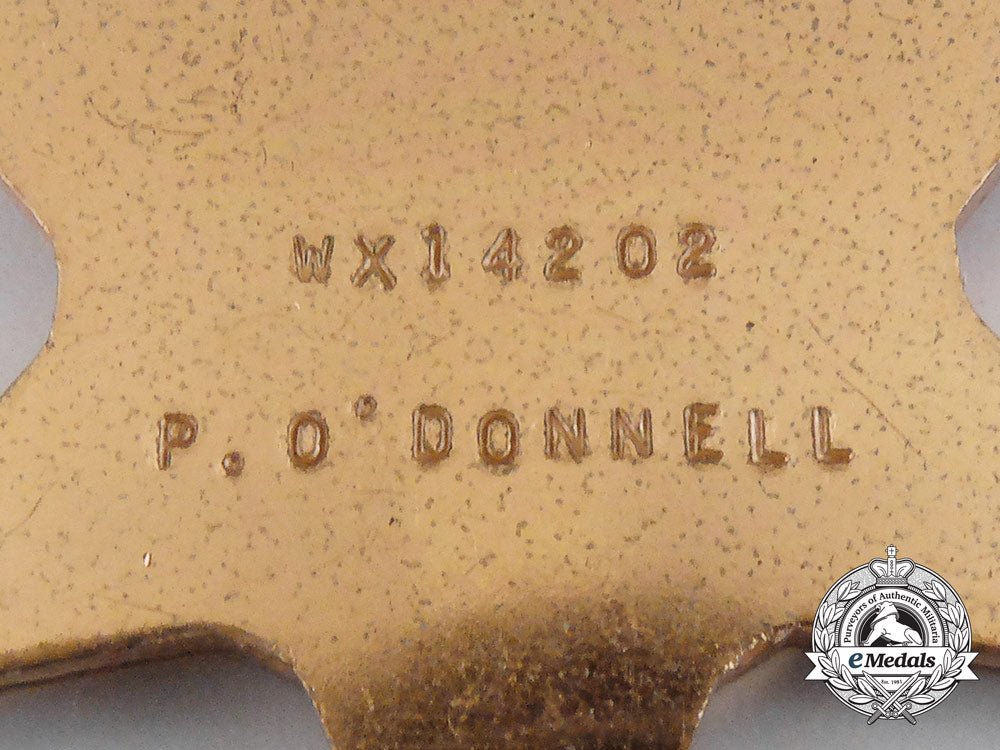
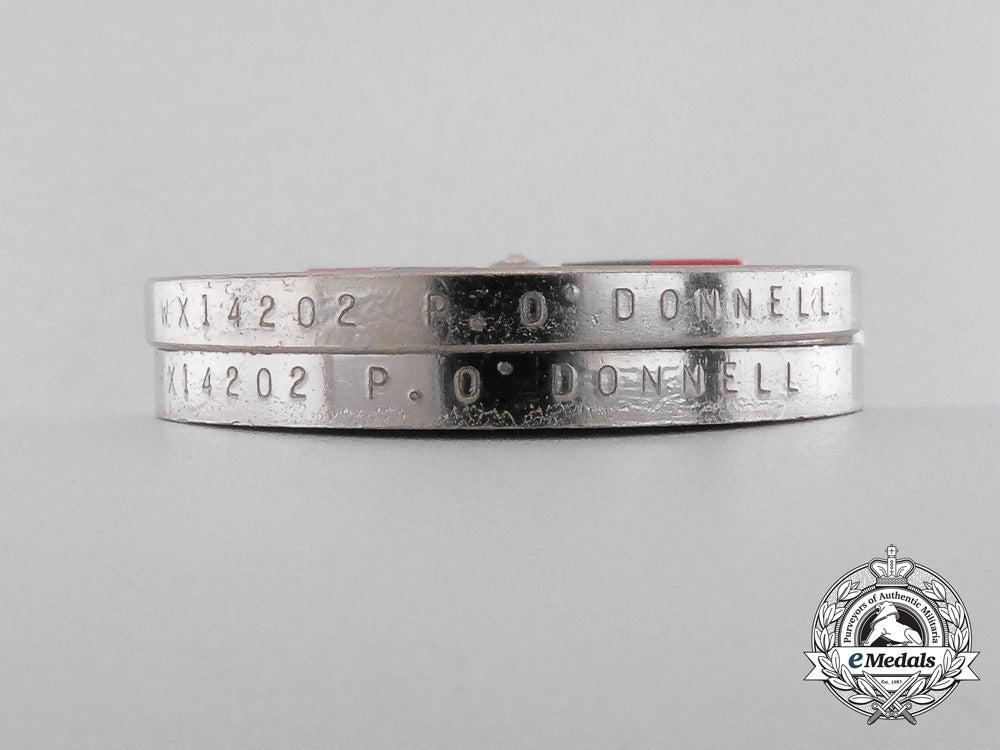
You May Also Like
Japan, Empire. A T90 Civil Defense Helmet, c.1943
W8287
Canada, CEF. A Large Oval Photo
C7175
International. A Lot of Five Medals & Badges
M0685-9
Italy, Kingdom. An Order of St. Maurice and St. Lazarus, c.1900
EU23629
Spain, Kingdom. A Royal and Military Order of St. Hermenegildo, Grand Cross Star, c.1880
EU23630
-
Japan, Empire. A T90 Civil Defense Helmet, c.1943
W8287
Add to CartRegular price $275 USDRegular price $0 USD Sale price $275 USDUnit price / per -
Canada, CEF. A Large Oval Photo
C7175
Add to CartRegular price $120 USDRegular price $0 USD Sale price $120 USDUnit price / per -
International. A Lot of Five Medals & Badges
M0685-9
Add to CartRegular price $200 USDRegular price $0 USD Sale price $200 USDUnit price / per -
Italy, Kingdom. An Order of St. Maurice and St. Lazarus, c.1900
EU23629
Add to CartRegular price $375 USDRegular price $0 USD Sale price $375 USDUnit price / per -
Spain, Kingdom. A Royal and Military Order of St. Hermenegildo, Grand Cross Star, c.1880
EU23630
Add to CartRegular price $685 USDRegular price $0 USD Sale price $685 USDUnit price / per
Do you have a similar item you are interested in selling?
Please complete the form and our client care representatives will contact you.
Sell Item